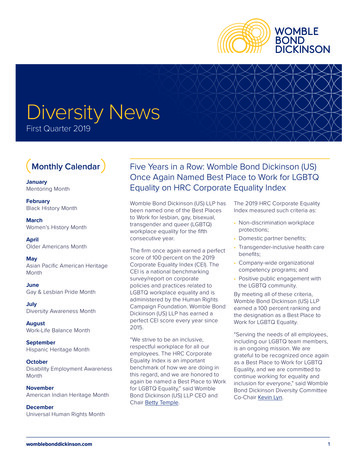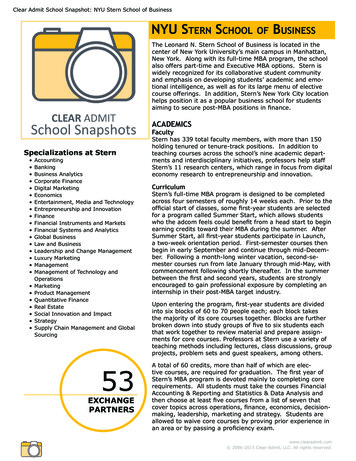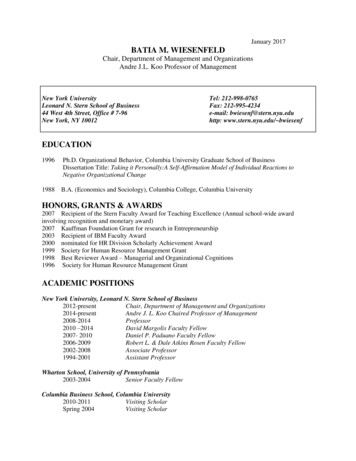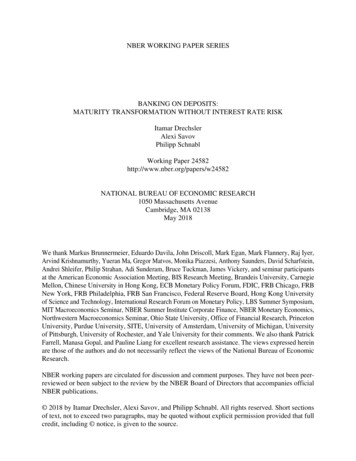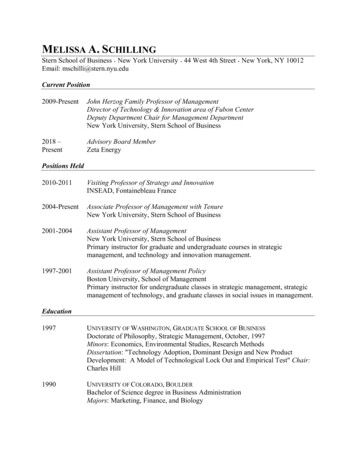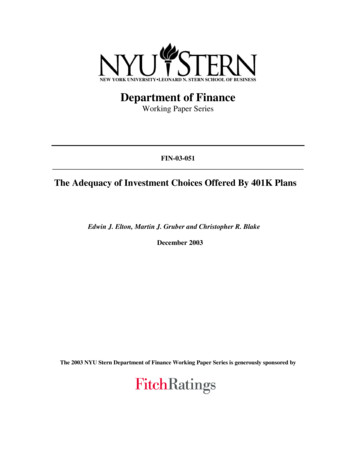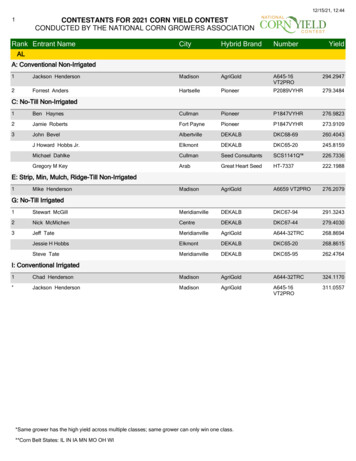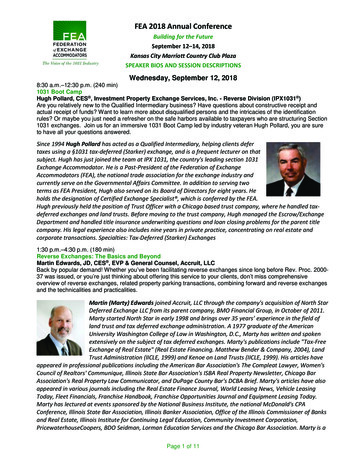
Transcription
womblebonddickinson.comAre Call Authentication MandatesComing?Marty Stern, PartnerWashington, DCApril 2019
The Robocalling Tsunami 47.8 billion robocalls in 2018 (60% increase from 2016) Many informational (bank, school, etc.) and legitimatetelemarketing to customers But vast numbers are from fraudsters and spammers Single largest source of complaints at the FTC and FCC 3.8 million robocalling complaints at the FTC in 2018 232,000 robocalling complaints at the FCC in 2018 Cheap, ubiquitous autodialing and Caller ID spoofingtechnologies, IP calling platforms, and off-shore actors havemade robocalling a favorite of fraudsters, and detection,tracking and enforcement close to impossiblep2
Existing Protections:TCPA and Truth in Caller ID Act Telephone Consumer Protection Act Prohibits autodialed and pre-recorded/artificial voice calls towireless numbers, absent “prior express consent” of calledparty Includes text messages Requires heightened prior express written consent forautodialed non-live voice telemarketing calls to wirelessnumbers and non-live voice telemarketing calls toresidential numbers National Do Not Call Registry Company-specific Do Not Call Lists
Existing Protections:TCPA and Truth in Caller ID Act Telephone Consumer Protection Act (con’t) Up to 1500 per call/text statutory damages Favorite of the class action plaintiff’s bar Has grown from 14 TCPA cases filed in 2007 to 3800 casesfiled in 2018, including almost 1000 class actions Targets have been legitimate companies, not scammers:- Capital One -- 75 million settlement in 2014- Caribbean Cruise Line -- 76 million 2016 settlement- Dish Network -- Verdicts against it totaling 341 million- Western Union -- 8.5 million 2018 payout
Existing Protections:TCPA and Truth in Caller ID Act Truth in Caller ID Act – Aimed at Caller ID Spoofing Prohibits the knowing transmission of misleading orinaccurate Caller ID Information: With the “intent to defraud, cause harm, or wrongfullyobtain anything of value” Was aimed at fraudulent and other harmful schemes Has been a handful of FCC enforcement actions, but notwidely used
Existing Protections:TCPA and Truth in Caller ID Act Bottom Line TCPA has been weaponized against legitimate companiesengaged in legitimate calling activities, resulting in millionsin payouts for class action plaintiffs and the class action bar,but has had no discernable impact on robocall scams andspam activity Same for Truth in Caller ID Act – While the FCC hasadopted several high-value penalties in Truth in Caller IDmatters, intended to send a message to robocallers, thesetoo have had no discernable impact on illegal robocalling So what next?
Carrier-Focused Approaches –Permissive Call Blocking Carriers have a duty to complete all calls, and historically,FCC has found call blocking to be unjust and unreasonable Has liberalized approach, permitting call blocking for certaincategories of numbers where calls are likely to be spoofed,spam robocalls: Calls from “Do not Originate” numbers Calls from invalid, unallocated, or unused numbers Classified text messages as an information service notsubject to common carrier blocking prohibition Clarified that consumers can use, and carriers can provide,blocking apps and technologies
Shift to Carrier-Focused Approaches:Call Authentication – SHAKEN/STIR Model SHAKEN/STIR -- ATIS/SIP Forum-developed framework thatauthenticates numbers as legitimate and prevents delivery ofcalls from spoofed numbers “Utilizes protocols that work together in an end-to-endarchitecture for the authorization and assertion of atelephone identity by an originating provider and theverification of the identity by a terminating provider” Includes the process for authenticating calls usingcertificates from a certification authority, i.e., a digitalsignature for the calling number; and The certificate management and governance model Technical Disclaimer
Shift to Carrier-Focused Approaches:Call Authentication – SHAKEN/STIR Model Implementation of SHAKEN/STIR and role of FCC is beingconsidered in an ongoing FCC NOI Among other things, significant issue is that SHAKEN/STIRworks for calls carried over an IP network using SIP, but notSS7-based systems One question NOI asks is whether it is practical to proceedwith a framework that applies to IP voice but not legacysignaling systems, and whether FCC should act to facilitatemore robust authentication for TDM and SS7 systems Chairman Pai also impatient with pace of implementation,demanding that carriers begin providing Caller IDauthentication in 2019, or risk regulatory intervention
Shift to Carrier-Focused Approaches:TRACED Act Bi-partisan anti-robocalling legislation with 50 sponsors,passed Senate Commerce in early April, headed to Senatefloor, bi-patisan companion bill introduced in House Sets FCC penalties for certain robocalling/TCPA violations to 10,000 per call with increased 3-year S/L Requires FCC, within 18 mos of enactment, to require aprovider of voice services to implement SHAKEN/STIR in itsIP network FCC directed not to take action if provider, within 12 mos ofenactment, has adopted and begun to implement and willbe capable of fully implementing within 18 mos.
Shift to Carrier-Focused Approaches:TRACED Act (con’t) FCC can extend implementation for a provider by 12 mos orlonger if it determines that purchasing or upgrading equipmentto support call authentication would constitute a substantialhardship for a provider or a category of providers FCC directed to adopt (1) when provider may block call basedon info provided by the framework; (2) safe harbor for liabilityfor unintended or inadvertent blocking, or misidentificationbased on info provided by framework; and (3) process forcalling party whose calls are blocked to verify authenticity ofits calls Key takeaway: Keep a close eye on TRACED Act – Is given areasonable likelihood of passage Also language not set in stone and may be amended
Questions?Marty Stern, Team LeaderCommunications, Technology & Media PracticeWomble Bond Dickinson (US) LLPmarty.stern@wbd-us.com202-857-4417
Telephone Consumer Protection Act (con't) . 75 million settlement in 2014 - Caribbean Cruise Line -- 76 million 2016 settlement - Dish Network -- Verdicts against it totaling 341 million - Western Union -- 8.5 million 2018 payout Existing Protections: TCPA and Truth in Caller ID Act Truth in Caller ID Act - Aimed at Caller ID .
